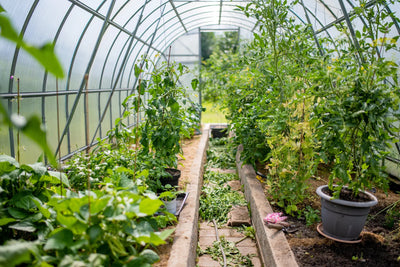Despite all the joys of survival gardening and the sustainability it provides, there are some downsides. Pests are part of every gardener's ongoing struggles, but there are ways to stay on top of it and stop them before they get out of control. Learn more about common pests, which bugs you want to hang around, and how to combat the problem naturally.
Common Survival Garden Pests
The type of pests you see will largely depend on your area and climate. But you can stay on top of common survival garden pests by watching out for some of these common bugs.
Japanese Beetles - Japanese beetles love flowers and folate and are happy to dig into your garden's leafiest areas. Some plants are more susceptible to attracting Japanese Beetles than others, including asparagus, corn, and soybeans.
Cabbage Moths - Cabbage is filling and dense with nutrition but also attracts cabbage worms that eat holes in your vegetables. Look for telltale signs of eggs, black excrement, and worms hanging around your cabbage.
Red Spider Mites - Red spider mites may start nibbling on your azaleas but are prone to infesting and spreading everywhere. They feed on the sap of plants and reproduce quickly.
Slugs - Those small holes in your tomatoes are probably caused by slugs looking for a juicy snack. They quickly get wound into the fruit and can cause decay and mold.
Cucumber Beetles - As the name implies, cucumber beetles feed on cucumbers, as well as melons, pumpkins, and squash plants. The results are browning leaves with a bacterial spread that could infect your other plants.
Flea Beetles - Flea beetles enjoy eating eggplants but are attracted to almost everything in your garden, from tomatoes to cabbage and turnips.
Stink Bugs - Stink bugs aren't native to the United States but were accidentally introduced in Allentown, Pennsylvania, in the last 1990s.They thrive on soybeans, flowers, fruit, and leaves but will also eat caterpillars.
Aphids - Despite how small aphids are, they can wreak havoc on your garden and suck fluids from plant leaves. You may also see them inside, hanging around your house plants.
Leaf Miners - Leaf Miners, which are common types of moths and flies, devour the leaf tissues of plants. They commonly eat leafy greens, tomatoes, onions, squash, beets, and more.
Colorado Potato Beetles - These garden pests primarily feed on potatoes but will also eat eggplant and tomatoes while adventuring through your garden.
Beyond bugs, remember that there are other garden pests to consider. Deer, rabbits, squirrels, rodents, dogs, raccoons, and cats will all root around in your garden looking for a snack. You may only have a few of them, but they're often more destructive than hundreds of bugs and aren't deterred by simple interventions.

Are All Garden Pests Bad?
Many insects won't harm your plants, and many are actually beneficial for your survival garden. Bees, butterflies, and some moths help pollinate crops or fend off dangerous insects. For example, ladybugs feed on smaller, soft-bodied insects, including aphid garden pests. So before you start killing off all those bugs, make sure some of them aren't there to help you.
Other pests, like small rodents, can also bring some benefits to your garden. Although you still want to get rid of them before they eat your fruits and vegetables, animal manure can be a good source of nitrogen that can help nourish your soil.
Tips for Getting Rid of Bad Pests Naturally
Most survival gardeners don't want to compromise their efforts for health and sustainability with toxic fertilizers and chemicals. If you do experience an outbreak or infestation, tread lightly. They aren't selective in what they kill and will usually wipe out everything in sight. Instead of reaching for manufactured spray that could do more harm than good, here are some natural ways to get rid of garden pests naturally.
Go Ultrasonic
Deer, squirrels, mice, and other hungry critters love digging in gardens and helping themselves to your yield. A Solar Powered Ultrasonic Pest Repeller lights up red and emits annoying sound waves to keep dogs, cats, rodents, raccoons, and other pests out of your garden.
Best of all, there are no batteries required. Just let it power up during the day with solar power, which will store enough to keep it running throughout the night. With minimal assembly, you can get it up and running in minutes and switch it on to start deterring hungry pests.
Install Bat Houses
Bats are among your survival garden's best protectors. They love eating mosquitoes, moths, beetles, crickets, leafhoppers, and more and will even help pollinate your garden. As bats enjoy night flowers and other items in your garden, they get pollen on their faces and bodies and keep pollinating.
You can attract bats and get rid of even more garden pests with bat houses. These specially designed-homes keep your bats safe, secure, and dry while they roost and sleep until evening.
Attract More Birds
Bats and birds are an ideal team for keeping garden pests at bay all day and night. Birds are happy to hang around your survival garden and dine on beetles, flies, aphids, grasshoppers, and crickets, to name a few. You'll save yourself time and money by making your homestead more attractive with a few feeders and bird baths.
Mix Up Some Natural Hot Pepper Spray
Just like humans, pests don't enjoy coming in contact with pepper spray. You can mix up a natural pepper repellent with a tablespoon of dried chile powder, a quart of water, and a teaspoon of mild soap. You can spray it directly on plants being attacked by deer, squirrels, rabbits, and insects.
Use a Homemade Soap Spray
Soap spray helps kill off soft-bodied insects without harming your plants. Mix a quart of water with a tablespoon of pure dish soap free of detergents and bleaches. If you don't see results, try an oil spray with a cup of vegetable oil and a tablespoon of mild soap to smother insects and keep them from attacking your survival garden.
Create an Egg and Garlic Spray
If your windows aren't too close to your survival garden, an egg and garlic spray can help deter deer and other animals from eating your plants. Whisk together three eggs, a few tablespoons of hot sauce, three tablespoons of garlic powder, and several tablespoons of water. Mix well and spray on your plants and around your garden.
Plant Pest-Resistant Varieties
There are no fruits and vegetables that pests will avoid altogether, but some are more prone to being resistant to bug infestation. If you live in the right hardiness zone, you can consider planting more chives, okra, peppers, and rhubarb to avoid some of your pest problems.
Remember, garden pests may end up attracting other bugs you want hanging around to help pollinate. Although you want to do everything you can to protect your survival garden, don't drive yourself crazy trying to remove every bug you see.

Next Steps
Garden pests are a nuisance but don't have to derail your efforts for a successful survival garden. With the right approach, you can deter them naturally and focus on growing a thriving yield that you actually get to enjoy. Shop for bat houses, ultrasonic pest control products, and vegetable-resistant plants here and protect your garden.











